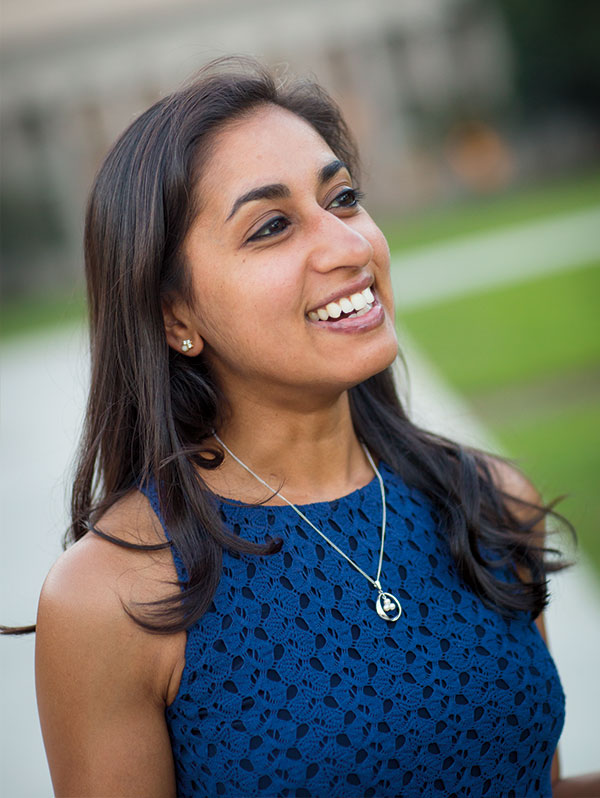Padmini Sushila Pillai ’05 is a woman with an eclectic reading list: At any given moment, she might be poring over articles from scientific journals such as Science and Nature, Agatha Christie’s mystery novels, and books about political history. She also keeps a playlist that covers an equally vast range. A shuffle of her music library triggers an unexpected—yet pleasing—lineup of the Grateful Dead, various hip-hop songs, Erykah Badu, Bossa Nova songs, and Chopin. Both lists could go on.
Although Pillai’s reading and music preferences might suggest that she is inclined toward breadth, her professional life demonstrates her commitment to depth. She works full time at the MIT Koch Institute for Integrated Cancer Research. In the Langer Lab, Pillai works under Robert Langer, ScD, who is widely considered to be the father of biomedical engineering. With Langer’s support, Pillai pursues an interdisciplinary research agenda that focuses on improving drug delivery to mucosal tissues such as the gastrointestinal tract.
Pillai’s passion for the sciences took root at Regis, where she majored in biochemistry and minored in math. Although the content she learned in her classes certainly prepared her for a life in the lab, she also acquired the confidence that she needed to succeed as a scientist.
“Regis helped me to become an independent, strong-willed woman,” she says. “To me, the university represented female empowerment.”
Pillai recalls two professors in particular—Jane Roman, PhD, and Jennifer Morrison, PhD—who empowered her from a young age. Roman, who taught organic chemistry, held Pillai to high standards early in college. “She expected a certain level of rigor, but she also expressed a lot of love.” Morrison, meanwhile, taught an English literature class on Spenser, Donne, and Milton. “Professor Morrison was the vision of a woman who is strong, intellectual, and confident.”
After graduating from Regis in 2005, Pillai secured an internship in a Harvard Medical School lab, where she researched ways to treat chronic inflammatory diseases. She then decided to continue this research as a PhD student in the immunobiology department at Yale University.
“Immunobiology is at the root of all diseases,” Pillai explains. “There’s a significant human impact factor.”
Once at Yale, she studied the way in which the immune systems use sensors to recognize the flu virus and incite an antiviral response. As she learned, these antiviral pathways eventually diminish in aging immune systems. Important research from her doctoral thesis, published in the journal Science, reveals how blocking certain pathways of inflammation could potentially prevent elderly people from dying of the flu. She also published an article that details current research on the topic. This article appears in the journal Nature Reviews Immunology.
Although Pillai had already discovered a passion for immunobiology research by the time she was in graduate school, an episode with her own body furthered her commitment to the cause. In 2013, she was diagnosed with a rare disease called acute intermittent porphyria. If not treated properly, the liver mutation can cause severe nerve and respiratory damage.
As Pillai discusses her disease, she makes deft shifts from the scientific to the sentimental. Almost at once, she transitions from talking about the enzyme pathways that are compromised as a result of the disease to the way in which the disease has changed her philosophy on life. “Since I have been diagnosed, I am even more thankful than I was before for the amazing friends and family in my life and for opportunities to do the things that make me happy.”




Perfect Ensemble
Given Pillai’s deep dedication and personal connection to immunobiology, it might be difficult to believe that there is another important layer to this five-foot-tall academic powerhouse. She has also established herself as a highly accomplished musician in the Boston area and beyond.
Although music is not Pillai’s day job, she is quick to highlight its role in her own life and the lives of others. She sees music as a force that’s just as vital as the hard sciences—it’s more than “just a hobby” or an incidental line at the bottom of her science CV. David Croll, PhD, her biochemistry and quantum physics professor at Regis, was one of the first people who encouraged her to pursue her musical interests alongside her science career.
“Science and medicine might be able to help a handful of people, or act on people with a particular ailment,” she says. “But with music, you can take a random collection of people—like a whole auditorium’s worth—and make things better for them all at once. Music is a reflection of our soul and of our society.”
While some scientists believe that music poses too much distraction from research, Pillai knows that her eclectic tastes make her a more complete human being.
In Unison
As Pillai’s academic studies became increasingly demanding at Regis and Yale, her commitment to music never wavered. Throughout college, she continued Carnatic (southern Indian classical) voice lessons that she had started as a child and sang in the Kuumba singers at Harvard. By maintaining her musical pursuits and making an effort to learn about new genres of music, she brought the same amount of rigor to her music as she brought to the work that was being assigned in her science classes.
Her professors at Yale encouraged her to pursue her hobbies and celebrated her musical successes. She eventually joined the Yale Citations, a graduate a cappella group, and the Cellmates, a science-themed rock band that she played in with her professors. She has sung backup for Grammy Award-winning singer songwriter Angelique Kidjo since 2011, which has led to gigs at the Newport Jazz Festival, Carnegie Hall, and Bonnaroo. Through performances with Kidjo, Pillai has shared the stage with musicians such as Josh Groban, David Byrne, and Ezra Koenig from Vampire Weekend, and performed to an audience that included band members from U2.
In September 2016, Pillai landed an especially meaningful musical opportunity at the grand opening of the Smithsonian National Museum of African American History and Culture.
“Singing at the Smithsonian was my all-time favorite gig. In light of the continued oppression of African-Americans in this country, the establishment of this museum is critical,” she says. “It teaches us about the American history of slavery, the many important contributions of blacks in American society, and about the struggle for civil rights and equality that we are still fighting today.”
As part of the televised performance, Pillai was able to meet celebrities such as Congressman John Lewis, former President Bill Clinton, and Oprah. Even though she was a bit star-struck, she adds, “It wasn’t about the celebrities. This event was about history and progress.”
Now residing in Boston with her husband, Krishna Sampath, Pillai is more passionate about her music than ever. When she arrives home after a busy day at the lab, she often listens to music or jams with Sampath, who is honing his guitar skills to accompany them as they sing together. While some scientists believe that music poses too much distraction from research, Pillai knows that her eclectic tastes make her a more complete human being.
“I don’t think I could live without making music,” she says. “Even when I have a success in lab, science itself is rarely soothing. Music is a release that helps me to build energy for everything else.”
Read more articles
Read the entire magazine online
Read the entire magazine in PDF format